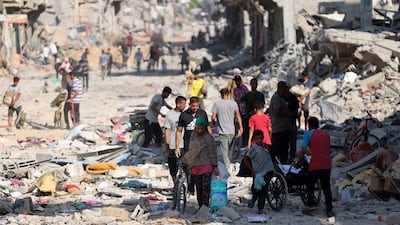Live updates: Follow the latest news on Israel-Gaza
At least 30 Palestinians were killed as Israeli forces stormed the Tal Al Hawa area of Gaza city early on Thursday, the civil defence said.
“We’ve received dozens of calls from residents there, saying the bodies of martyrs are filling the streets,” civil defence spokesman Mahmood Bassal said in a statement on Telegram.
Civilians are trapped inside their homes, including people with severe injuries, he said.
Some civil defence members were shot at by Israeli forces as they attempted to reach victims, Mr Bassal said.
The Israeli military told civilians to leave Tal Al Hawa and nearby areas on Monday, warning that its troops would be carrying out operations in the area, before expanding its evacuation order to most of Gaza city a day later.
The army dropped leaflets addressed to “everyone in Gaza city” that set out “safe routes” to the central area of the Gaza Strip and warned that the city would be “dangerous combat zone”.
Ahmad Abu Jarad is refusing to leave his home in the Al Tuffah neighbourhood, in the east of the city.
“We figured the directions by Israel were a false alarm, so we returned to our home in Al Tuffah despite not being sure if the area is safe or not,” Mr Abu Jarad told The National. “So how will we leave Gaza city for the south? We will not leave.”
Israel’s evacuation order for the whole of Gaza city is causing “mass suffering”, the UN said.
As many as 350,000 people were living in the areas marked for evacuation, according to the UN humanitarian agency OCHA.

Beginning with its assault on the southern city of Rafah in early May, the Israeli army has issued repeated evacuation orders as it stepped up ground offensives across Gaza.
The army said on Wednesday that it had completed its operations in Shujaiya, a neighbourhood east of Gaza city, where it had ordered residents to leave before launching two weeks of intensive fighting.
The military said its operation, which involved elite Israeli units, destroyed eight tunnels and “eliminated dozens of terrorists, destroyed combat compounds and booby-trapped buildings” in the area.
Mr Bassal said Shujaiya had become a “ghost town” after suffering extensive damage to “infrastructure and residential areas”.
“We are telling the world for the millionth time that the reality in the Gaza Strip is tragic and that there must be action from international and human rights institutions,” he said.
In the south, the UN humanitarian co-ordinator for the occupied Palestinian territory, Mahannad Hadi, said Khan Younis has mostly been reduced to sand and rubble.
Every building in the city was damaged in some way, Mr Hadi said during a rare visit to the besieged enclave.
He said women he had spoken to said they had cut off their hair as “extreme overcrowding” in temporary shelters and tent camps was leading to the spread of lice.
Documenting those who have been killed is becoming an issue, officials said on Thursday.
Mohamed Al Mughir, the head of documentation in Gaza's Civil Defence, said 500 Palestinian families have been wiped out, causing the family name to die with them.
At least 12 entire families were killed in the Nuseirat camp operation last month.
“The process of documenting families whose members were all martyred is still ongoing, despite losing about 20 per cent of the documentation due to bombing, displacement, targeting of Civil Defence crews, and the lack of internet to document electronically,” Mr Al Mughir said in a press statement.

